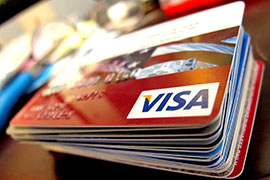- Slug: BC-CNS-Holiday Spending,550
- Photo available (thumbnail, caption below)
By TOM BLANTON
Cronkite News
WASHINGTON – Americans say they intend to spend less on holiday gift-giving than they did last year, but will likely give in to the spirit of the season and end up spending slightly more, according to a forecast released Monday.
The annual forecast by the Consumer Federation of America and the Credit Union National Association predicts a “2.5 to 3 percent” increase in holiday spending this year, driven by the continuing economic recovery and the fact that shoppers typically shell out more than they plan to.
“In every one of the 16 years we’ve done this survey, more people say they’ll reduce spending than increase spending,” said Bill Hampel, chief economist at CUNA. “In all but two of those years, spending actually increased.”
This year’s survey of 1,000 consumers showed 38 percent saying they planned to spend less than last year while just 10 percent said they would dish out more. The remaining respondents said they would spend roughly the same amount, the report said.
While just one in 10 respondents reported plans to spend more, Hampel said the survey shows only “what people say they intend to spend, not what they actually do.”
By analyzing “historical trends of responses to our survey, compared to actual results on spending,” he said his group was able to predict that spending will actually rise by 2.5 to 3 percent this year. Still, they called that a “disappointing” increase given the general improvement in household finances over the year.
Higher spending wouldn’t surprise Kelly Griffith, executive director of the Tucson-based Center for Economic Integrity, who said Arizonans continued to spend on gift-giving even in the depths of the recession, because spending during the holidays has become a social norm.
“This time of year, it’s natural to spend more,” said Griffith, whose center is affiliated with the Consumer Federation of America.
“Spending money during the holidays is sort of a cultural expectation now,” Griffith said. “People can say they’re going to spend less, but when it actually comes down to it you’re going to buy that gift for your kids.”
She said that impulse is likely bolstered by the country’s rising employment and continued recovery from the recession.
Despite the urge to splurge, the report found a correlation between household income and expected holiday spending.
“Those reporting a worse financial situation, concern about making debt payments, and lack of extra funds for emergencies are predictive of expecting to spend less money this holiday season,” the study said.
The survey included questions about consumers’ financial well-being that showed 29 percent of respondents saying they were better off heading into the holidays this year than they were last year. In contrast, 24 percent reported being in worse financial shape.
“There’s still a very large minority of households that are struggling financially,” said Steven Brobeck, executive director of CFA. “We continue to recover from the Great Recession. People are still really concerned about their financial condition and the economy.”
Consumers were also asked whether they had “extra funds to pay for an unexpected $1,000 expense,” Brobeck said
“Back in 2012, a higher percentage of respondents said they didn’t,” Brobeck said. “There’s been continual improvement right up to 2015.”
In the 2012 survey, 49 percent of respondents said they had an extra $1,000, while this year the rate was 54 percent.
^__=
Web Links:
_ CFA-CUNA Annual survey: http://www.cuna.org/Stay-Informed/Press-Room/Press-Releases/2015-Press-Releases/CONSUMERS-EXPECT-SLIGHTLY-LOWER-LEVEL-OF-HOLIDAY-SPENDING-THAN-LAST-YEAR,-ACCORDING-TO-16TH-ANNUAL-CFA-CUNA-HOLIDAY-SPENDING-SURVEY/
_ Consumer Federation of America: http://consumerfed.org/
_ Credit Union National Association: http://www.cuna.org/
_ Center for Economic Integrity: http://economicintegrity.org/
^__=
A new survey says holiday spending should rise a “disappointing” 2.5 to 3 percent this year – even though four times as many people said they planned to spend less this year than the number of people who said they planned to spend more. (Photo by frankieleon via flickr/Creative Commons)
